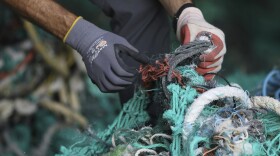Hawaii’s Pacific Islander communities have been hit hardest by the COVID-19 pandemic. However, it is not clear if they are actually receiving the vaccine.
It was a rainy day outside Kalihi Palama Health center as people over the age of 65 sat in front of the facility waiting to get their COVID-19 vaccination. It was part of a clinic put on by We Are Oceania, a Micronesian advocacy group.
“It takes trust,” said Josie Howard, the organization’s program director.
“When they see familiar faces, when they hear people who can speak their language, and who can understand the culture, and the language makes it really easy for them to trust. And I think because we have a relationship established already, that it made it easier for us. And having staff from each community on our team made it really easy.”
Pacific Islanders account for about a quarter of the state’s COVID-19 deaths despite making up only about four percent of the state’s population.
A survey by the state department of health showed that Black, Pacific Islander and Samoan communities are least likely to trust the vaccine--and advocates say that may be due to a lack of access.
The Pacific Empowerment and Advancement Executive Director at the University of Hawaii, Tina Tauasosi-Posiulai worried that the COVID-19 vaccine was not reaching Pacific Islander communities.
“There was a lot of people that were interested in getting the vaccine and then we found out later that you have to be 75-years-old to get the vaccine,” she said.
“My concern is that this Pacific Island population, it's a very young population compared to the Asians and the whites. So if you're looking at them starting at age 75 getting the vaccine, they leave left out a lot of Pacific Islanders.”
According to the state Department of Business and Economic Development those over the age of 65 make up less than 5% of the Pacific Islander community in Hawaii. In comparison, 22% of Japanese and 12% of white residents are over the age of 65.
In fact, only 2% of Marshallese residents are in that elderly age group.
That means even fewer are over the age of 75-- the age group the Department of Health is currently vaccinating.
These population counts are why Dr. Emmanuel Kintu at Kalihi Palama Health Center is willing to vaccinate those 65 and above.
“It gave me the strength and ammunition to go to the state and say, ‘Well, you know what, I learned something myself as well. As we talked to the community. They presented this situation, we checked it out’,” he said.
“There are very few people in this community who are 75 and above in the Pacific Islander community, so for them, I think we need to be a little bit more flexible when it comes to age.”
Tauasosi-Posiulai was concerned that if she continued to push people to get the vaccine, but there’s no place for them to get it, it will degrade long-built relationships.
“We're trying to do more education, why COVID-19 testing is very important for our population. But that trust, I don't want to lose that trust,” she said.
She thought another barrier was the lack of many Pacific Islander non-profit groups beyond We Are Oceania, the Marshallese Community Organization of Hawaii and newly developed Pacifica Empowerment and Advancement. She noted that many of the positions are volunteer-based and not paid.
It is not yet known who has been vaccinated because DOH has not yet released that information.
A department spokesperson said they are still working on getting their vaccination partners to consistently enter data into the federal Vaccine Administration Management System.
Hawaii Public Radio will continue to explore the state’s vaccine hesitancy and how to fix it.




